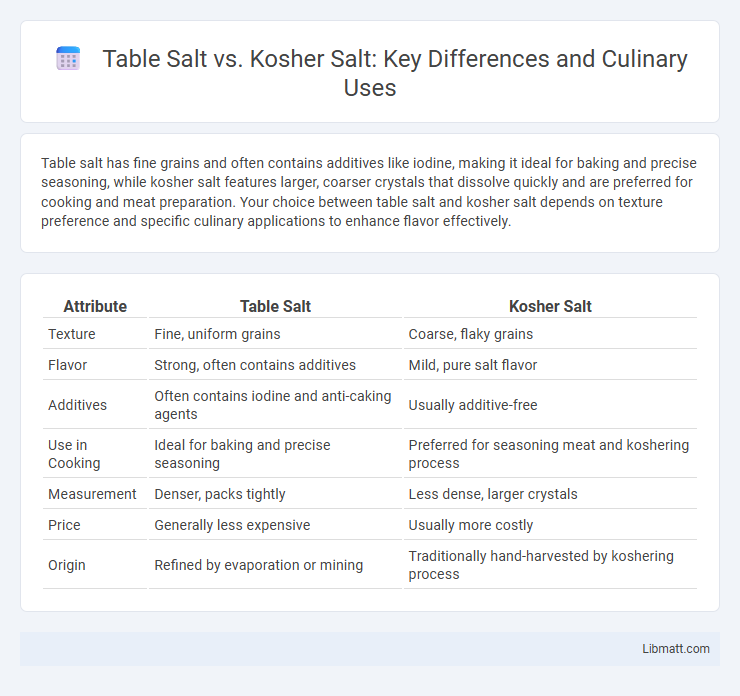Table salt has fine grains and often contains additives like iodine, making it ideal for baking and precise seasoning, while kosher salt features larger, coarser crystals that dissolve quickly and are preferred for cooking and meat preparation. Your choice between table salt and kosher salt depends on texture preference and specific culinary applications to enhance flavor effectively.
Table of Comparison
| Attribute | Table Salt | Kosher Salt |
|---|---|---|
| Texture | Fine, uniform grains | Coarse, flaky grains |
| Flavor | Strong, often contains additives | Mild, pure salt flavor |
| Additives | Often contains iodine and anti-caking agents | Usually additive-free |
| Use in Cooking | Ideal for baking and precise seasoning | Preferred for seasoning meat and koshering process |
| Measurement | Denser, packs tightly | Less dense, larger crystals |
| Price | Generally less expensive | Usually more costly |
| Origin | Refined by evaporation or mining | Traditionally hand-harvested by koshering process |
Introduction to Table Salt and Kosher Salt
Table salt is a finely ground salt commonly fortified with iodine and anti-caking agents, making it a staple for everyday cooking and baking. Kosher salt features larger, coarser flakes without additives, favored by chefs for its texture and ease in seasoning meat. Both salts differ significantly in grain size, flavor intensity, and culinary applications, influencing their effectiveness depending on the recipe.
Chemical Composition Differences
Table salt primarily consists of sodium chloride (NaCl) with finely ground crystals and often includes additives like anti-caking agents and iodine to prevent clumping and iodine deficiency. Kosher salt contains larger, coarser grains of sodium chloride and generally lacks additives, resulting in a purer chemical composition. The absence of additives in kosher salt affects its flavor profile and dissolving rate compared to table salt.
Texture and Grain Size Comparison
Table salt consists of fine, uniformly small grains that dissolve quickly, making it ideal for baking and precise seasoning. Kosher salt features larger, coarser flakes that provide a crunchy texture and are easier to pinch, enhancing your control during cooking. The significant difference in grain size affects how each salt adheres to food and influences seasoning distribution in recipes.
Flavor Profiles and Culinary Uses
Table salt has a fine grain and a concentrated, intense saltiness that dissolves quickly, making it ideal for baking and precise seasoning. Kosher salt features larger, coarser crystals with a milder, cleaner taste, enhancing the texture and flavor of meats and vegetables during cooking. Your choice between these salts can impact the balance and layering of flavors in recipes, especially when seasoning by hand.
Processing Methods and Additives
Table salt undergoes extensive processing to remove impurities and often includes additives like anti-caking agents to ensure free-flowing grains. Kosher salt is less processed, retaining a coarser texture and typically contains no additives, making it preferred in culinary applications for its purity and ease of handling. The absence of additives in kosher salt also affects its flavor and how it interacts with food compared to the more refined table salt.
Health Implications and Sodium Content
Table salt contains finely ground sodium chloride with added iodine and anti-caking agents, which can benefit thyroid health but may lead to higher sodium intake per teaspoon compared to kosher salt. Kosher salt has larger, coarser grains that typically contain less sodium by volume due to air gaps, potentially supporting better portion control and reduced sodium consumption. Choosing kosher salt can help you moderate sodium intake while maintaining flavor, but be mindful of differences in volume when substituting it for table salt in recipes.
Solubility and Performance in Cooking
Table salt features finer grains that dissolve quickly, making it ideal for precise seasoning and baking applications where rapid solubility is essential. Kosher salt has larger, coarser crystals that dissolve more slowly, offering better control when seasoning meat and providing a satisfying texture for finishing dishes. Understanding these differences can enhance your cooking performance by selecting the appropriate salt based on solubility needs and desired flavor distribution.
Cost and Availability
Table salt is typically more affordable and widely available in supermarkets worldwide, making it a convenient choice for everyday cooking. Kosher salt tends to be slightly more expensive and may not be stocked in every grocery store, but it is favored by chefs for its coarse texture and ease of pinching. Your choice between the two can depend on budget constraints and access to specialty food stores.
Substitution Tips in Recipes
When substituting table salt for kosher salt in recipes, use about half the amount of table salt since it is more finely ground and packs more densely. Kosher salt's larger, flaky crystals provide less surface area, so adjusting salt quantities is crucial for maintaining the desired flavor balance in Your dishes. Measuring by volume rather than weight can lead to over-salting, so consider using a kitchen scale for precise substitution.
Choosing the Right Salt for Your Kitchen
Table salt, with its fine, uniform grains and added iodine, dissolves quickly and is ideal for baking and seasoning during cooking. Kosher salt, characterized by its larger, coarse flakes, provides better control for seasoning meat and finishing dishes, offering a cleaner taste without additives. Selecting the right salt for your kitchen depends on your cooking style and desired flavor intensity, ensuring your dishes achieve perfect seasoning every time.
Table Salt vs Kosher Salt Infographic

 libmatt.com
libmatt.com